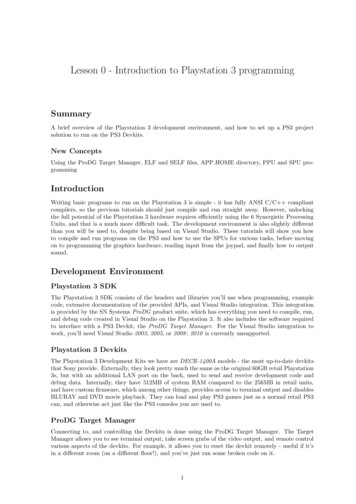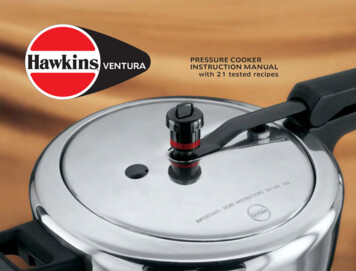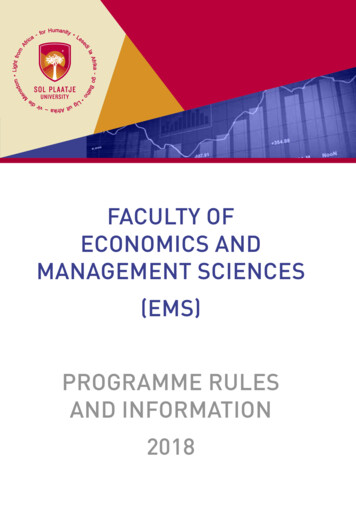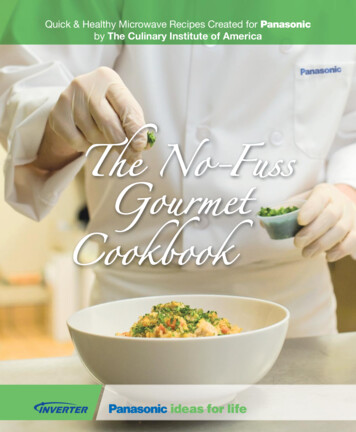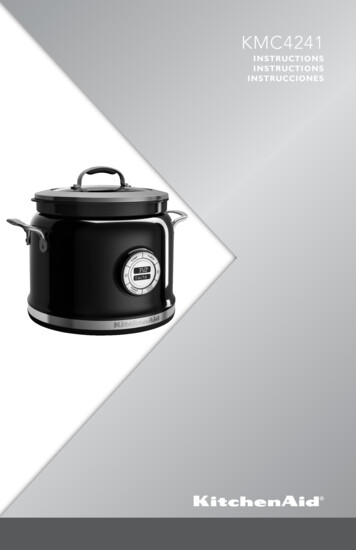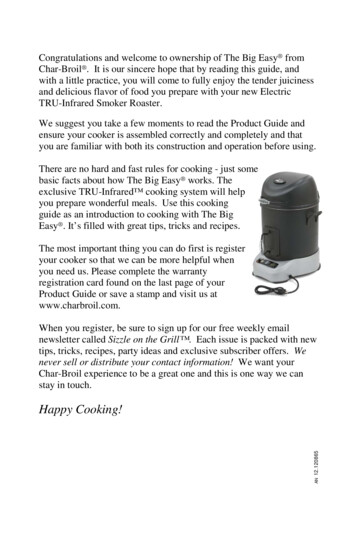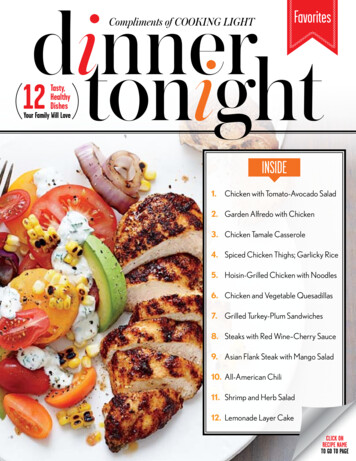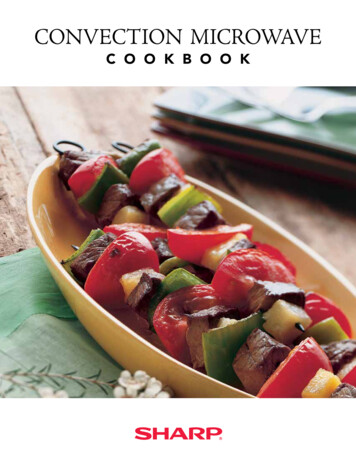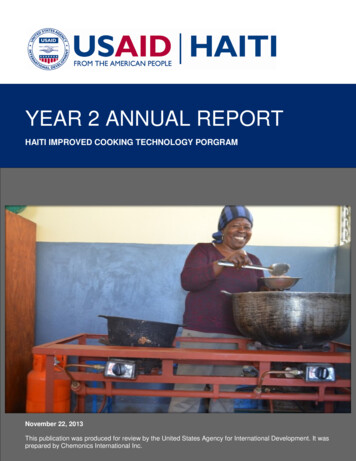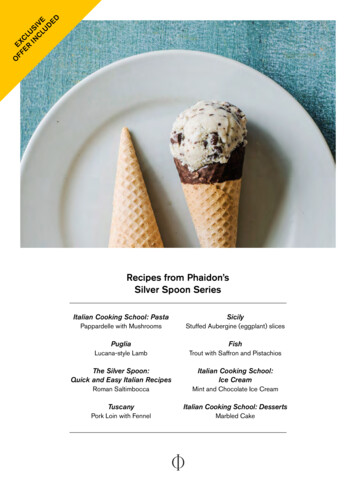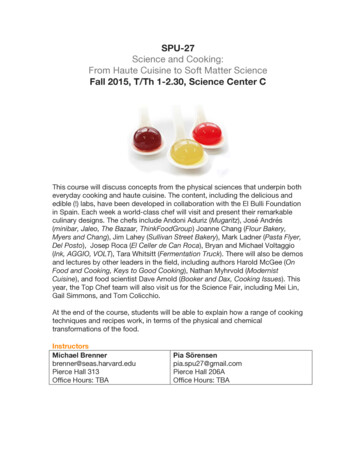
Transcription
SPU-27Science and Cooking:From Haute Cuisine to Soft Matter ScienceFall 2015, T/Th 1-2.30, Science Center CThis course will discuss concepts from the physical sciences that underpin botheveryday cooking and haute cuisine. The content, including the delicious andedible (!) labs, have been developed in collaboration with the El Bulli Foundationin Spain. Each week a world-class chef will visit and present their remarkableculinary designs. The chefs include Andoni Aduriz (Mugaritz), José Andrés(minibar, Jaleo, The Bazaar, ThinkFoodGroup) Joanne Chang (Flour Bakery,Myers and Chang), Jim Lahey (Sullivan Street Bakery), Mark Ladner (Pasta Flyer,Del Posto), Josep Roca (El Celler de Can Roca), Bryan and Michael Voltaggio(Ink, AGGIO, VOLT), Tara Whitsitt (Fermentation Truck). There will also be demosand lectures by other leaders in the field, including authors Harold McGee (OnFood and Cooking, Keys to Good Cooking), Nathan Myhrvold (ModernistCuisine), and food scientist Dave Arnold (Booker and Dax, Cooking Issues). Thisyear, the Top Chef team will also visit us for the Science Fair, including Mei Lin,Gail Simmons, and Tom Colicchio.At the end of the course, students will be able to explain how a range of cookingtechniques and recipes work, in terms of the physical and chemicaltransformations of the food.InstructorsMichael Brennerbrenner@seas.harvard.eduPierce Hall 313Office Hours: TBAPia Sörensenpia.spu27@gmail.comPierce Hall 206AOffice Hours: TBA
Teaching FellowsHead-TFLab ManagerTeaching FellowsKatherine PhillipsMai NguyenSid VenkatMishu DudataOlivia MillerSören BrandtCharles MargaritEvan JonesSixun ChenAndy ShumakerLiuchuen TongHidenori TanakaLulu LiuJon RussellPrerequisitesHigh school physics and chemistry will be useful. Background material will bereviewed using videos developed for the HarvardX class.ExpectationsYou are expected to attend all lectures and lab sections, submit weekly problemsets and lab worksheets, take two midterm exams, and write and present a finalresearch project. The class will have no final exam.LecturesLectures will be held in Science Center C on Tuesdays and Thursdays from 1to 2.30 pm. Tuesday lectures begin with a 20-minute introduction about therelevant scientific topic, followed by a presentation by a visiting chefwho discusses culinary applications of this topic. Thursday lectures are led bythe course instructors and go deeper in to the science. A portion of the materialcovered on Thursdays will be especially designed to prepare you for the week’shomework. The lectures will not be video-recorded, but the majority of thescience material is available in the form of short videos that were developed forthe online HarvardX class. Note: out of respect for the chefs, no laptops can beused during their presentations.Lab SectionsSections and labs are combined into a single 2-hour block, at which attendanceis required. In the past, this has been the highlight of the course for moststudents—you will make measurements on recipes that you can then eat! Thefirst half hour of each section will be devoted to a review of scientific concepts.Following this, you will prepare an edible recipe in a team of 2-3 students, andmake measurements along the way, to illustrate the concepts discussed inlecture. At the end of each section you are expected to turn in a brief labworksheet. No make-up labs will be offered, but you can drop your lowestscore on worksheets and prelabs. Labs take place in a food-safe lab in theNorthwest Building, Level B1, Room 143. You must sign up for section usingthe online sectioning tool (a link is available on the course website). The deadlineto section is Monday, September 7th at 11.59 pm. Sections will begin on
Thursday September 10th, and are scheduled throughout the day and eveningThursday-Wednesday. No section changes are allowed after Thursday,September 17th. Section switching due to illness, job-interviews, or similar canbe granted in exchange for a dean’s or doctor’s note on a case by case basis. Inspecial circumstances you may get half-credit for excuses that do not fall withinthese categories. All section switching must be confirmed prior to section by thehead-TF.Note: The course involves the preparation and (optional) consumption offood. If you have specific food allergies or needs, please be in touch withthe course staff to discuss arrangements.Lab work sheetThe lab worksheet is a brief but integral part of lab and contains questions aboutthe experiments, your results, and data analysis. The worksheet is due at theend of each lab section. You are allowed to drop your one lowest worksheetscore.HomeworkWeekly homeworks are due in your TF’s homework box on the second floor ofthe Science Center before start of class on Thursdays. No late problem sets areaccepted. You are allowed to drop your one lowest problem set score duringthe semester.ExamsThere will be two in-class midterm exams, scheduled on October 8 andNovember 19. The first midterm covers materials in weeks 1-4, i.e. throughThurs 10/1, and the second midterm covers material in weeks 5-9 (DiffusionFermentation). The class has no final exam.Final ProjectsAll students will carry out a practical project in groups within their lab sections toconnect some aspect of cooking to science. The results of these projects will bepresented at a course-wide science fair, to be held on Tuesday, December8th.GradingThe final course grade will take into account the following components:Homework15%9 weeks, drop lowest scoreLab worksheet20%7 lab worksheets and prefabs (drop lowest score)Midterm exams 2x20% 2 midterm examsProposal, progress reports, finalFinal project25%report, science fair
HarvardX VideosSubstantial material for this class has been developed in the form of videos forthe HarvardX class. This material covers the scientific and cooking concepts in 10 minute videos – the science videos were made by the faculty teaching theclass, and the cooking videos by our visiting chefs (they were often filmed in thekitchens of their restaurants). Watching of these videos is mostly optional, andwe recommend that they be used as review and supplementary materials. Asmall number will be recommended as useful background before lecture, oroccasionally assigned as part of solving homework problems. However, thelarge majority of the material in this course will be covered in lecture and labs.All videos are available on the course website.TextbooksTwo texts will be useful for this course. Each week, recommended, but notrequired, readings will be drawn from these books.On Food and Cooking, Harold McGee, Scribner, 2004 (2nd edition)On Food and Cooking will significantly enhance your understanding ofthis subject and serve as a truly invaluable resource and reference,both for this class and beyond. It is available in hard copy at the Coop(new 40, used 30) and as an eTextbook ( 25).Science and Cooking: A Companion to the Harvard Course, 2015Science and Cooking: A Companion to the Harvard Course is basedon the transcripts from the HarvardX science videos. This text servesas a summary of all of the science that is covered in the course. Thecourse will be made available for free from the instructors, details tobe announced.Additional TextsMore specific texts covering the scientific aspects of cooking, and the basicscience, are listed below. Most of these are on reserve in Cabot library – for acomplete list see the course website.The following books cover various aspects of the science contained in thecourse:The Science of Good Cooking, America’s Test KitchenThe Science of Cooking, Peter BarhamThe Science of Chocolate, Stephen T. BeckettThe Science of Ice Cream, C. ClarkeCookwise, Shirley CorriherKeys to Good Cooking, Harold McGeeThe Curious Cook, Harold McGeeModernist Cuisine, Nathan Myhrvold, Chris Young, and Maxime Billet Ratio,Michael Ruhlman
Several of the guest lecturers have written cookbooks, which may be of interest:A Day at El Bulli, Ferran AdriàMade in Spain: Spanish Dishes for the American Kitchen, José AndrésTapas: A Taste of Spain in America, José AndrésLiquid Intelligence: The Art and Science of the Perfect Cocktail, DaveArnoldFlour: Spectacular Recipes from Boston’s Flour Bakery Café, JoanneChangFlour, too: Indispensable Recipes for the Café’s Most Loved Sweets andSavories, Joanne ChangMy Pizza: The Easy No-Knead Way to Make Spectacular Pizza at Home,Jim LaheyMy Bread: The Revolutionary No-Work, No-Knead Method, Jim LaheyEl Celler de Can Roca, Jordi, Josep, and Joan RocaSous Vide Cuisine, Joan RocaVOLT ink: Recipes, Stories, Brothers, Bryan and Michael Voltaggio, EdAndersonHome: Recipes to Cook with Family and Friends, Bryan VoltaggioFor a more advanced discussion of the scientific topics in the course:Physical Chemistry of Foods, Pieter WalstraAcademic IntegrityDiscussion and the exchange of ideas are essential to doing academic work. Forassignments in this course, you are encouraged to consult with your classmatesas you work on problem sets and labs. However, after discussions with peers,make sure that you can work through the problem yourself and ensure that anyanswers you submit for evaluation are the result of your own efforts. In addition,you must cite any books, articles, websites, lectures, etc that have helped youwith your work using appropriate citation practices. Similarly, you must list thenames of students with whom you have collaborated on problem sets.Accommodations for Students with DisabilitiesStudents needing academic adjustments or accommodations because of adocumented disability must present their Faculty Letter from the AccessibleEducation Office (AEO) and speak with the professor by the end of the secondweek of the term, September 12th. Failure to do so may result in the CourseHead's inability to respond in a timely manner. All discussions will remainconfidential, although Faculty can contact the AEO to discuss appropriateimplementation.
Schedule at a GlanceWeek 0: IntroductionTh 9/3 Introduction, overview of the courseWeek 1: Components of Food and Historical BackgroundT 9/8 A history and introduction to science and cookingGuest speakers: Harold McGee (On Food and Cooking), Dave Arnold (CookingIssues, Booker and Dax)Th 9/10 Food components; Moles; Scientific dissection of Nestle Toll HouseChocolate Chip cookie RecipeWeek 2: Energy, Temperature, HeatT 9/15 Myths of cooking pastaGuest speaker: Mark Ladner (Pasta Flyer, Del Posto)Th 9/17 Energy, calorimetry, molecular bonds, heating and temperatureWeek 3: Phase TransitionsT 9/22 The science of sugar, crystallizationGuest speaker: Joanne Chang (Flour Bakery and Café)Th 9/24 Phase behavior macroscopically and microscopically, temperature,pressure, phase diagrams, violations to phase diagrams.Week 4: ElasticityT 9/29 Elasticity, gluten networksGuest speaker: Jim Lahey (Sullivan Street Bakery, NYC)Th 10/1 Mouthfeel, texture, molecular origins of elasticity, gels, steak, tofu, flanWeek M1: Review and MidtermT 10/6 ReviewTh 10/8 MIDTERM (covers through elasticity, 10/1)Week 5: Diffusion and SpherificationT 10/13 Gelation, spherification, diffusion and infusionGuest speaker: Andoni Aduriz, Ramon Perisé (Mugaritz)Th 10/15 Gelation, cross-linking, polymers, spherification, random walkWeek 6: Heat TransferT 10/20 Heat transfer introductionGuest speaker: Josep Roca (El Celler de Can Roca)Th 10/22 Heat transfer, transition temperature, diffusion of heat, baking a cakeWeek 7: Viscosity and PolymersT 10/27 Viscosity introduction
Guest speaker: José Andrés (minibar, Jaleo, The Baazar, ThinkFood group)Th 10/29 Viscosity, molecular origin, role of temperature, thickeners and foodadditivesWeek 8: Emulsions and FoamsT 11/3 Emulsions and Foams introductionGuest speaker: Bryan and Michael Voltaggio (Ink, VOLT, AGGIO, etc)Th 11/5 Emulsions, surfactants, elasticity of elastic materials, mayonnaise,culinary foamsWeek 9: Enzymatic Reactions and FermentationT 11/10 enzymatic reactionsTh 11/12 chemical processes in microbes, fermentation, yeastWeek M2: Fermentation, Review and MidtermT 11/17 Cooking with fermentationGuest speaker: Tara Whitsitt (Fermentation Truck)Th 11/19 Midterm # 2 (Covers Week 5-9)Week 10: Modernist CuisineT 11/24 Modernist cuisineGuest speaker: Nathan Myhrvold (Modernist Cuisine)Th 11/26 ThanksgivingWeek 11: Final Wrap-UpT 12/1 CandyTh 12/3SCIENCE FAIR: Tuesday, December 8thGuests: Mei Lin, Gail Simmons, Tom Colicchio (Top Chef)
Modernist Cuisine, Nathan Myhrvold, Chris Young, and Maxime Billet Ratio, Michael Ruhlman On Food and Cooking, Harold McGee, Scribner, 2004 (2nd edition) On Food and Cooking will significantly enhance your understanding of this subject and serve as a truly invaluabl
